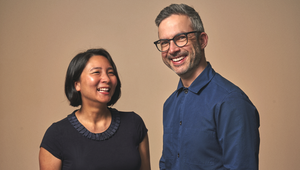
Filling the Whitespace of Underserved Needs - The New Mum Economy

According to the CQC Maternity Survey 2021, 53% of women said they wished they had been given more information about their physical recovery. The post-birth experience can be quite an isolating one for new mothers who are facing challenges they haven’t been remotely prepared for. Trying to heal both their body and mind in synergy is no easy feat; especially when they now have a brand new, tiny human, who is dependent on them for survival.
There’s insult to injury when all resources are directed towards the new born, rather than the mother herself.
When Thread co-founder Lilian Tse gave birth in Hong Kong, she noticed a huge disparity between the treatment of women post-birth in her home country when compared to that in the West. Lilian notes that in Hong Kong it is common practice to hire a nanny to take care of you and the new born, plus there are lots of nutrition-based products to help with recovery too. When Lilian returned to London she saw that the majority of services on offer for new mums were medical, rather than holistic. This, coupled with 15 years of working in innovation, spurred Lilian and Thread to explore the idea of a ‘New Mum Economy’ - a place where women’s needs are more closely considered in that all important ‘fourth trimester’.
To understand the market, Thread has undergone extensive research to understand the underserved needs of new mothers, identify examples of forward-thinking brands moving into this space, and show how marketers could contribute to the lives of new mothers in a truly meaningful way.
Taking Inspiration from What Works
The difference in how new mothers are treated is not limited to London - it’s a common theme throughout the western world. Mother-centric approaches are present throughout culture and history in the Asian and LATAM regions of the world. Women are treated with medicine and services that are geared towards supporting the new mum and baby in tandem - there is much to be learned from these places.
The idea behind the New Mum Economy takes inspiration from traditions that have always existed outside of the west. In China, the period following the birth is known as ‘the sitting month’ or ‘the confinement tradition’ and it prioritises the mother’s recovery and well-being. In Mexico a similar practice is called ‘La Cuarentena’ which likewise centres the new mother and the new baby holistically.
Why Now?
When Lilian was asked, “Why now?”, her answer was simple; Millennials and gen z are now becoming mums and the pandemic has led to an awakening of self-care. The narrative is beginning to shift amongst this generation of mothers and they want to centre their well-being. A realisation is forming that prioritising self-care is not selfish but rather beneficial to both the mother and the new born.
This has been a point echoed by one of the mothers in Thread’s research who said: “I need to make sure my body and mind is stronger than before I gave birth, so that I can be the best mother for my daughter for the rest of my life.”
Heather Sheen, head of planning for R/GA Australia, made a great point in relation to the current moment we find ourselves in. Heather noted that a few years ago we, as a global community, witnessed a much-needed revolution in the femcare category, saying, “Brands like Bodyform replaced sanitised, fabricated blue dye demos and euphoric white bikini frolicking with the reality of blood and pain.”
The same kind of revolution, according to Heather, is needed here. She cemented this point, noting, “an overhaul of how we present pregnancy, childbirth and parenthood is long overdue. It’s time to start normalising all the perfectly normal stuff; the cracking, tearing, crying, stretching, struggling.”
The Need for a More Mother-Centred Focus
When we begin to investigate the current state of affairs as they relate to serving new mothers, we realise that this area is blatantly unaddressed and there is an opportunity here for businesses to meet a great need.
Women have discussed not getting information or support regarding issues such as pelvic floor rehabilitation, and how postnatal checks are being rolled together with the new-born's checks, minimising the time dedicated to the mother herself. Often resulting from a lack of support and information, there are palpable consequences for mental health; 40% of parents have reported experiencing anxiety or post-traumatic stress symptoms in the first month after birth. Other reports show equally harrowing results; with 70% of new and expectant mums revealing that they had felt mentally unwell during or after their pregnancy.
These numbers should not be ignored.
So What is the ‘New Mum Economy’?
Within the UK, US and much of Europe, women have reported feeling unseen in the ‘fourth trimester’ as the attention dramatically shifts from the pregnant women to the baby. But things are changing. Research has shown that the post-birth market is expected to grow by 60% over the next 7 years, reaching over $46bn, which much of the new growth starting to shift towards serving the holistic needs of mothers not just baby.
A great example of a brand who is thinking about the wellbeing of the mother is Nike. Nike’s (M)ove Like a Mother program is a doctor approved, 48-week maternity workout program. The program is centred around there being no punishments, no guilt and no comparisons — it is all about the things that will make you feel good from the inside out. This is exactly the kind of innovation that will bolster the New Mum Economy
In addition, supplements are an excellent way to bring healing into a busy routine. Formulated with a board of medical advisors, Premama offers a robust line-up of prenatal and postnatal offerings, providing key nutrients, supplements, as well as lactation support drink-mix formula.
When we reached out to Boots, they shared the sentiment that becoming a parent is a life-changing event which can naturally bring with it some health anxiety as you transition from pregnancy into parenthood. This is why Boots’ focus is on continued innovation and investment in services that support parents into the “life stage”.
Often, the most convenient channel for the mother will be through her phone. Boots has tapped into this, adding ‘Expert Midwife’ as a service within the new Boots Health Hub. Offering virtual classes and advice to pregnant women, Expert Midwife continues that journey post-birth. There are four workshops that offer a deep dive into breastfeeding, c-section recovery, vaginal birth recovery, and recovery in general. Boots’ Paula Bobbett, chief digital officer, shares, “Being able to access this support from the comfort of their own homes allows women to fit this into their lives at a time that is convenient to them.”
Continuing on a similar thread, My Fourth is another great example of home-based assistance during the fourth-trimester. The ‘Virtual Doula’ service, is the ultimate guide for the fourth trimester, created with care and expertise by the doulas at Major Care. There is a clear opportunity for brands and employers to provide support, care and coaching, through the most accessible channel for the mother.
When asked about what place the new mum economy has, in the current political and economic climate, Lilian said: “the new mum economy is not about squeezing additional money from mothers, but redistributing what is already being poured into their families and new born babies. It is the same pot of money which should be spread out more fairly to be inclusive of the mother rather than exclusive of her.”
Impact Beyond Measure
Solidifying the point of “genuine need”, Heather told us, “for the one in six Australian women who experience depression, the most likely time of onset is in the first few weeks after childbirth.” Yet the issue is one that transcends borders.
We know from the research that the kind of assistance offered by the New Mum Economy can work to help new mothers in a way which can make a difference to both their mental and physical health. When a mother enters this space, everyone in the family benefits. Brands have the chance to not only fill the empty white space of underserved needs, but to make a real difference to the lives of individuals who are responsible for all life itself.










